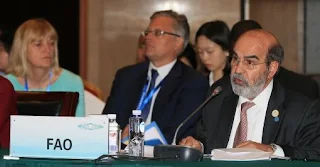The Least Developed Countries (LDCs) stand to benefit from strong partnerships with their Global South counterparts when it comes to making their agrifood systems more efficient, more inclusive, more sustainable and more resilient, the Chief Economist of the Food and Agriculture Organization of the United Nations (FAO), Maximo Torero, said in Doha."Strong global partnerships, including South-South and Triangular Cooperation, provide key support for agrifood systems transformation, and an open exchange of knowledge and expertise around this important topic," Torero said in an FAO address to a ministerial meeting on South-South Cooperation in the Qatari capital.
Search NaijaAgroNet
Showing posts with label ministers. Show all posts
Showing posts with label ministers. Show all posts
Wednesday, March 8, 2023
5th UN Conference: Chief Economist raps LDCs ministers in Doha - NaijaAgroNet
NaijaAgroNet:
... Linking agrobiz, sustainable environs, people & technology
Labels:
5th,
Chief Economist,
conference,
Doha,
LDCs,
ministers,
NaijaAgroNet,
raps,
UN
Tuesday, November 22, 2022
COP27: African ministers explore ways to scale up food production, feed continent - NaijaAgroNet
... Linking agrobiz, sustainable environs, people & technology
The African agriculture ministers attending the United Nations climate summit in Egypt reiterated a commitment to work with development partners to unlock the continent’s agriculture potential.
The African agriculture ministers attending the United Nations climate summit in Egypt reiterated a commitment to work with development partners to unlock the continent’s agriculture potential.
Labels:
African,
continent,
COP27,
explore,
Feed,
Food,
ministers,
NaijaAgroNet,
production,
Scale up,
way
Friday, June 10, 2016
G20 Ministers of agriculture affirm importance of ICT
The G20 Ministers of
Agriculture have affirmed the importance of Information and Communication
Technology (ICT) at the end of their meeting, reports NaijaAgroNet.
A communique from the
meeting made available to NaijaAgroNet, the ministers affirmed the importance
of ICT in agriculture, calling it “essential to human, social and economic
development,” and stressing “the potential to reach farmers --including smallholders
and family farmers-- with timely and accessible content on markets, sustainable
and efficient farming practices and new technologies
The partnership structured
at the G20 meeting, NaijaAgroNet gathered is part of a larger digital strategy Food
and Agriculture Organisation (FAO) is developing to integrate a wide
range of technologies, ranging from satellite data to mobile phones and social
platforms, with the agency’s work to support the most vulnerable with access to
information and bottom-up learning.
“We have to bear in
mind that small farmers in developing countries are often constrained in their
access to inputs, technology, and markets. In order to ensure that farmers
fully leverage the ICT opportunities, it is essential to provide digital
tailored access, foster capacity development and facilitate the exchange of
experiences,” he said.
The FAO Director-General,
José Graziano da, highlighted joint work between FAO and G20 countries on such
projects as the Agricultural Market Information System (AMIS),
the Tropical Agriculture Platform (TAP) and the G20 Technical Platform for the Measurement and Reduction
of Food Loss and Waste.
He also underlined the
ongoing international efforts to address Antimicrobial Resistance in
partnership with the World Health Organization and the World Organization for
Animal Health and called on G20 countries to support FAO in this
endeavour.
... Linking agrobiz, sustainable environs, people & technology
Labels:
affirm,
Agriculture,
G20,
ICT,
importance,
ministers
Friday, April 24, 2015
200 dead as late rains, floods threaten food security – SADC
Executive
Secretary, Southern African development Community, (SADC) Dr. Lawrence
Stergomena Tax, has at a recent SADC Council of Ministers meeting held in
Harare, Zimbabwe confirmed that late last year’s floods and rains of early this
year, has threatened food security in the Southern Africa region, NaijaAgroNet reports.
NaijaAgroNet
learnt that the food security situation in the region is expected to be less
than satisfactory during the 2015/16 marketing year as a result of poor rains
in most parts of the region, dry spells in some areas, and floods in other
areas.
Dr
Tax, NaijaAgroNet learnt, expressed dissatisfaction over the situation,
noting that SADC would continue to monitor the situation and support early
warning for food security and vulnerability assessments in the member states.
In
a report on food security assessment presented at the 34th SADC Summit held in
Victoria Falls, Zimbabwe in August last year, NaijaAgroNet gathered that the region had recorded a cereal surplus of
more than 670 000 metric tonnes during the previous agricultural marketing
season year.
This,
according to the report, was mainly attributed to good rainfall, better access
to inputs such as seeds and fertilizer, as well as credit facilities and
extension services.
NaijaAgroNet
also learnt that the floods of which affected parts of Southern Africa between
late last year and early this year, left 200 people dead and 500,000 displaced
in Malawi, while in Mozambique, about 27, 838 households suffered losses in
cash crops.
Meanwhile
SADC during the council meeting, deliberated on innovative ways of dealing with
problems associated with changes in weather patterns, NaijaAgroNet gathered that the Chairperson of the SADC Council of
Ministers, Simbarashe Mumbengegwi, said it was now time for the region to seek
ways to curb increased frequency and intensity of extreme weather events, such
as droughts and floods which adversely affects key sectors of the regional
economy including agriculture.
Mumbengegwi,
who is also Zimbabwean Foreign Affairs Minister, told NaijaAgroNet that SADC to help deal with poor rains, would invest more
in regional water infrastructure development such as irrigation, allowing the
region to farm all year around and not only depend on climatic conditions to
deal with poor rains.
As
agriculture is the backbone of most economies in southern Africa, and more than
62 percent of the SADC region’s 277 million people are dependent on agriculture
for their livelihoods, NaijaAgroNet
gathered that the Council of Ministers, would canvass for an increased budget
allocations to agriculture as well as targeted subsidy programmes that would
result in farmers accessing agricultural inputs and farm implements at cheaper
rates.
Daniel
Nsolibe/GEE
... Linking agrobiz, sustainable environs, people & technology
Tuesday, July 1, 2014
Convention tasks environment ministers on illegal wildlife trade
THE Convention on International Trade in
Endangered Species of Wild Fauna and Flora (CITES) has called on environment
ministers to support the war against illegal wildlife trade, NaijaAgronet gathered.
The call was made in a statement issued by
the secretariat of the ongoing UN Environment Assembly in Nairobi, Kenya, and
made available to NaijaAgroNet.
According to the statement, the ministers
should be at the fore front of addressing the ecosystem which is under threat
from illegal wildlife trade.
The statement stressed that illegal
wildlife trade had been an issue of priority in international conferences for
the past three years.
``From the UN Security Council to the World
Heritage Committee, there is recognition at the highest political levels of the
economic, social, environmental and security impacts of this highly destructive
criminal activity. The focus now has to be on the front line. This means even stronger
law enforcement and demand-reduction efforts across multiple countries, to
reverse the current dangerous trends. CITES decisions and compliance processes
underpin the global effort.”
Secretary-General of CITES, John Scanlon
was quoted as saying that, ``Ultimately, this fight will be won or lost on the
front lines, whether in the field, the courtroom, or the market place but not
in a conference room. We have had a lot of important high-level events over the
past three years and we must now better focus our collective efforts on local,
national and regional actions.
``The effects of illegal wildlife trade on
natural assets were highlighted earlier this month when the World Heritage
Committee added Selous Reserve in Tanzania to the `in danger’ list under the
World Heritage Convention due to the impacts of poaching for illegal trade.
Illegal logging, poaching and wildlife crimes have an impact on over 50 per
cent of the Natural World Heritage Sites”.
According the statement, the effects of
illegal wildlife trade on natural assets were highlighted earlier this month at
the 38th session of the UNESCO World Heritage Committee, held in Doha.
The statement further quoted Scanlon, as
saying: ``We cannot allow poaching for the illegal trade in wildlife and the
global crime syndicates behind it to destroy entire species.
``The world is losing the building blocks
of our ecosystems that we all rely upon. ‘Africa’s elephants are also known as
the ‘ecological engineers’ they disperse the seeds of the food they eat and are
an essential part of healthy and diverse ecosystems.
``Healthy ecosystems also provide essential
services for people from the provision of fresh water to wildlife-based
tourism.’’
The statement, noted that both UNESCO and
CITES had expressed concern over World Heritage sites across Africa that were
suffering from a surge in poaching.
It said the organisations had expressed
concern for poaching, especially for elephants, which is diminishing their
natural heritage value and appeal as wildlife tourism destinations, which can
have severe economic consequences.
``Half of the 14 African World Heritage
sites monitored under the CITES Monitoring the Illegal Killing of Elephants
(MIKE) programme are now on the `in danger’ list.
``The CITES Secretariat is working with the
UNESCO World Heritage Centre to better protect these iconic sites.
``The degradation of World Heritage sites
through poaching for illegal trade is destroying these beautiful wildlife-based
tourism assets impoverishing local people and national economies as well as the
world’s natural heritage,” the statement added.
... Linking agrobiz, people & technology
Subscribe to:
Comments (Atom)






